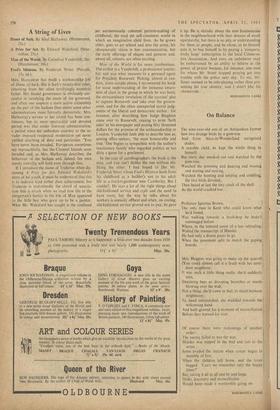A String of Lives
MRS. HATHAWAY HAWAY has made a workmanlike job of Dame of Sark. She is Sark's twenty-first ruler,
inheriting from her often terrifyingly eccentric father. Her feudal government is obviously suc- cessful in satisfying the needs of the governed, and often one suspects a more active citizenship on the part of the Sarkees than trnder some other administrations more formally democratic. Mrs.
Hathaway's service to her island has been con- tinuous, but its most spectacular and devoted period was that under German administration, a period when her unbroken courtesy to the in- vader imposed reciprocal moderation yet never yielded anything of duty and patriotism. 'You
have never been, invaded,' Europeans sometimes say reproachfully, but the Channel Islands were invaded and, as Mrs. Hathaway describes, the behaviour of the Sales and, indeed, her own sturdy morality will hold even through that.
If I introduce the name of Traherne when dis- cussing A Prize for Art. Edward Wakeford's story of his youth. it must be understood that this is to indicate kind rather than achievement, but Traherne is undoubtedly the chord of associa- tion that is struck when we read how life in the clergyman's family in the Isle of Man appeared to the little boy who grew up to be a painter. What Mr. Wakeford has caught is the confused
yet autonomously coherent pattern-making of childhood, the mad yet self-consistent world in which an imaginative child lives. As he grows older, goes to art school and into the army, his idiosyncratic vision is less communicative, but the early offerings of shapes and patterns and, above all, colours, are often exciting.
Man of the World is far more rumbustious. The author is a Vanderbilt, a professional journa- list, and was what amounts to a personal agent for President Roosevelt. Picking, almost at ran- dom, some sample plums, I recommend his book for some understanding of the immense aware- ness of class in the group in which he was born, the extraordinary revelation of the tycoons' plot to capture Roosevelt and take over the govern- ment, and for the often unexpected moral judg- ments of the liberal and democratic author : for instance, after describing how Judge Bingham came over to Roosevelt, ceasing to print `both sides' in his newspaper and paying fifty thousand dollars for the promise of the ambassadorship to London. Vanderbilt feels able to describe him as, among office-seekers, 'the most honourable and true.' One begins to sympathise with the author's reactionary family who regarded politics as too dirty a game for a gentleman.
In the case of autobiographers the book is the man, and you can't dislike the one without dis- liking, the other. 1 had hoped to like Mr. Frederick Street whose Fool's Mistress leads from his childhood as a builder's son to his adult life as a market-gardener near Camberley. But I couldn't. He says a lot of the right things about old-fashioned service and craft and the need to have roots; but the way he talks about his workers is uneasily offbeat and when, on costing, old-fashioned service proved not to pay, he gave it up. He is vitriolic about the new businessmen in the neighbourhood with their dreams of small squirearchy, but there is no pity or understanding for them as people; and he chose, as he himself puts it, to buy himself in by paying a 'compara- tively large' subscription to the local Conserva- tive Association. And even an unbeliever may be embarrassed by an ability to believe in the power of prayer because, for instance, one man for whom Mr. Street stopped praying got into trouble with the police next day. To me, Mr. Street seemed to be role-playing rather than pre- senting his true identity; and I didn't like his chosen role.
MARGHANITA LASKI














































 Previous page
Previous page